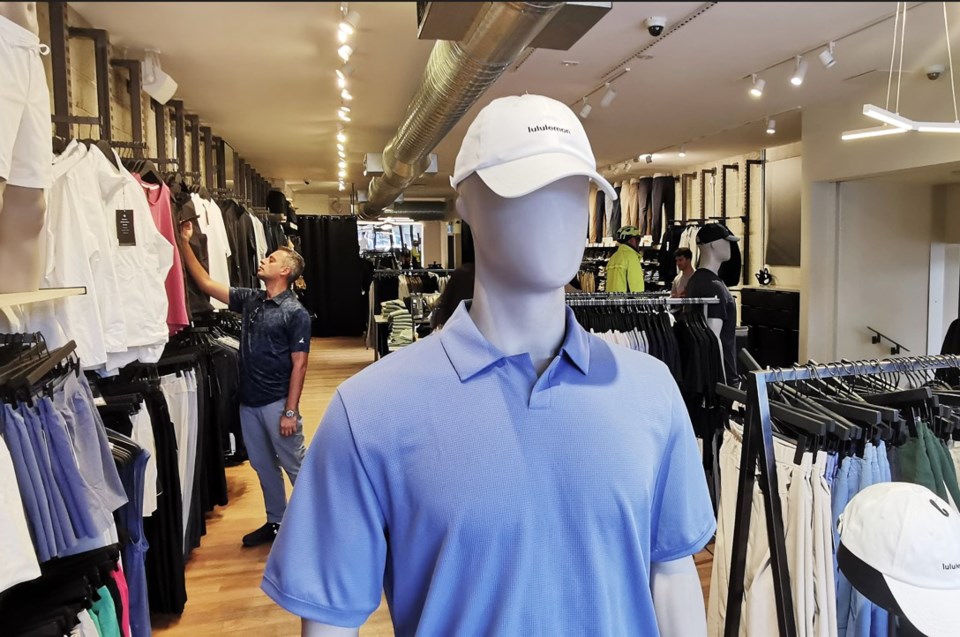Challenges keep piling up at Vancouver-based athleisure retailer Lululemon Athletica Inc. (Nasdaq:LULU).
The company's shares were down as much as 9.7 per cent this morning, hitting a four-year low of US$245.69, following an analyst downgrade, news that it is pausing sales of its Breezethrough leggings and reports that consumers are spending less on activewear.
“After three years of exceptionally strong growth in the active apparel market (particularly in the U.S.), the category has slowed meaningfully," wrote Citigroup analyst Paul Lejuez in a research note released this morning.
"We see no signs of that dynamic changing."
What's more is that Lejuez, who downgraded the company's shares to neutral from buy, said he believes the slowing-sales trend for activewear has "decelerated further" this quarter compared with last quarter. He cut Lululemon's price target to US$300 from US$384.
Lululemon shares hit an all-time-high closing price of US$511.29 on Dec. 29—the last trading day of 2023. That means that its share price was down nearly 52 per cent so far this year at today's low.
The analyst downgrade follows Lululemon pausing sales of its new Breezethrough leggings product line due to an uninspired consumer response.
"We have made the decision to pause on sales for now to make any adjustments necessary to deliver the best possible product experience,” Lululemon told BIV this morning in an email.
“We’re excited with Breezethrough’s fabric innovation. As a test and learn organization, we also take guest feedback seriously and there is an opportunity to incorporate what they’ve shared into future designs."
Lululemon launched this leggings collection mere weeks ago. The product is distinctive in that it is made with lightweight, fast-drying fabric and is designed for hot-yoga classes and hot summer weather.
When BIV searched for the leggings, and clicked a Lululemon-sponsored link, a page appeared on the Lululemon website saying "Oops! Something Went Wrong."
Trouble has been brewing for a while
Large investors in the company have been unimpressed with its direction.
Founder Chip Wilson still owns a large stake in the company, but that has not kept him from criticizing the athleisure giant for trying to chase higher profit margins and embarking on what he said was a “slow march to becoming The Gap (NYSE:GPS), with cheap acrylic sweaters,” according to a March LinkedIn post.
Another contributing factor to the company’s share-price decline was its May 22 announcement that its well-regarded, longtime chief product officer, Sun Choe, was leaving the company. Shares fell as much as seven per cent that day.
VF Corp. (NYSE:VFC) two weeks later announced that it had hired Choe to become global brand president at its Vans division in late July. VF Corp.’s share price rose 10 per cent following that news, again underscoring Choe’s influence and esteem in the fashion world.
Instead of replacing Choe, Lululemon said it will have a team of leaders with new roles.
Operational mistakes have not helped.
Lululemon warned the market in March that it made mistakes in its spring fashion line. The clothing was largely black, white and tan, and lacked colours that consumers wanted to buy, Wedbush analyst Tom Nikic told BIV last month.
“Lululemon is never going to be the kind of brand that has a lot of super-bright, in-your-face products, but [the assortment] really was just too muted,” he said.
Lululemon also faces heightened competition from companies such as Alo Yoga, The Gap Inc.-owned (NYSE:GPS) Athleta and Vuori.
Lululemon’s last reported quarter was for the three-month period ended April 28, when sales increased 10 per cent year-over-year, to US$2.2 billion. That was in line with what stock market analysts had expected.
The company kept its sales outlook for the year unchanged, at between 11- and 12-per-cent growth year-over-year, which would put sales between US$10.7 billion and US$10.8 billion.




